Marketing Principles 6: Food Waste Recycling - A Sustainability Report
VerifiedAdded on 2022/10/19
|6
|965
|428
Report
AI Summary
This report analyzes the implementation of marketing principles in the context of food waste recycling, focusing on its profile as a sustainable offering. The report begins by highlighting the sources and challenges of food waste, emphasizing the potential of recycling to produce environmentally friendly manure. It then explores the nature, type, and value of the recycling process, emphasizing its sustainability benefits and job creation potential. An environmental analysis examines political, economic, social, technological, ethical, and legal factors influencing food waste recycling. A SWOT analysis assesses the strengths, weaknesses, opportunities, and threats associated with the process. Market and customer analysis identifies the target market, customer needs, market share, and growth potential. The report concludes with a discussion of information needs and consumer influencers, including the role of recycling in presenting an innovative process and its benefits to the external environment.
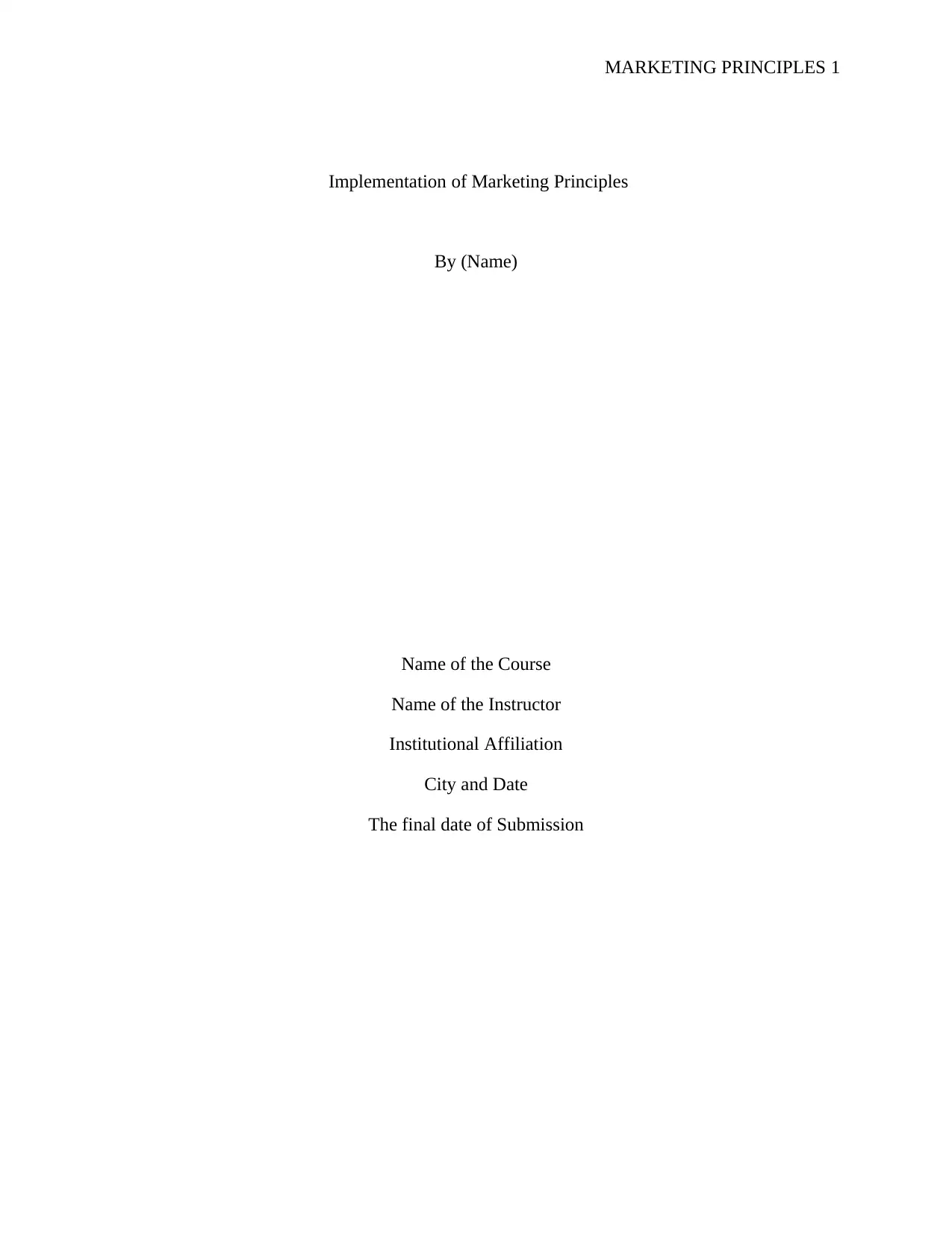
MARKETING PRINCIPLES 1
Implementation of Marketing Principles
By (Name)
Name of the Course
Name of the Instructor
Institutional Affiliation
City and Date
The final date of Submission
Implementation of Marketing Principles
By (Name)
Name of the Course
Name of the Instructor
Institutional Affiliation
City and Date
The final date of Submission
Paraphrase This Document
Need a fresh take? Get an instant paraphrase of this document with our AI Paraphraser
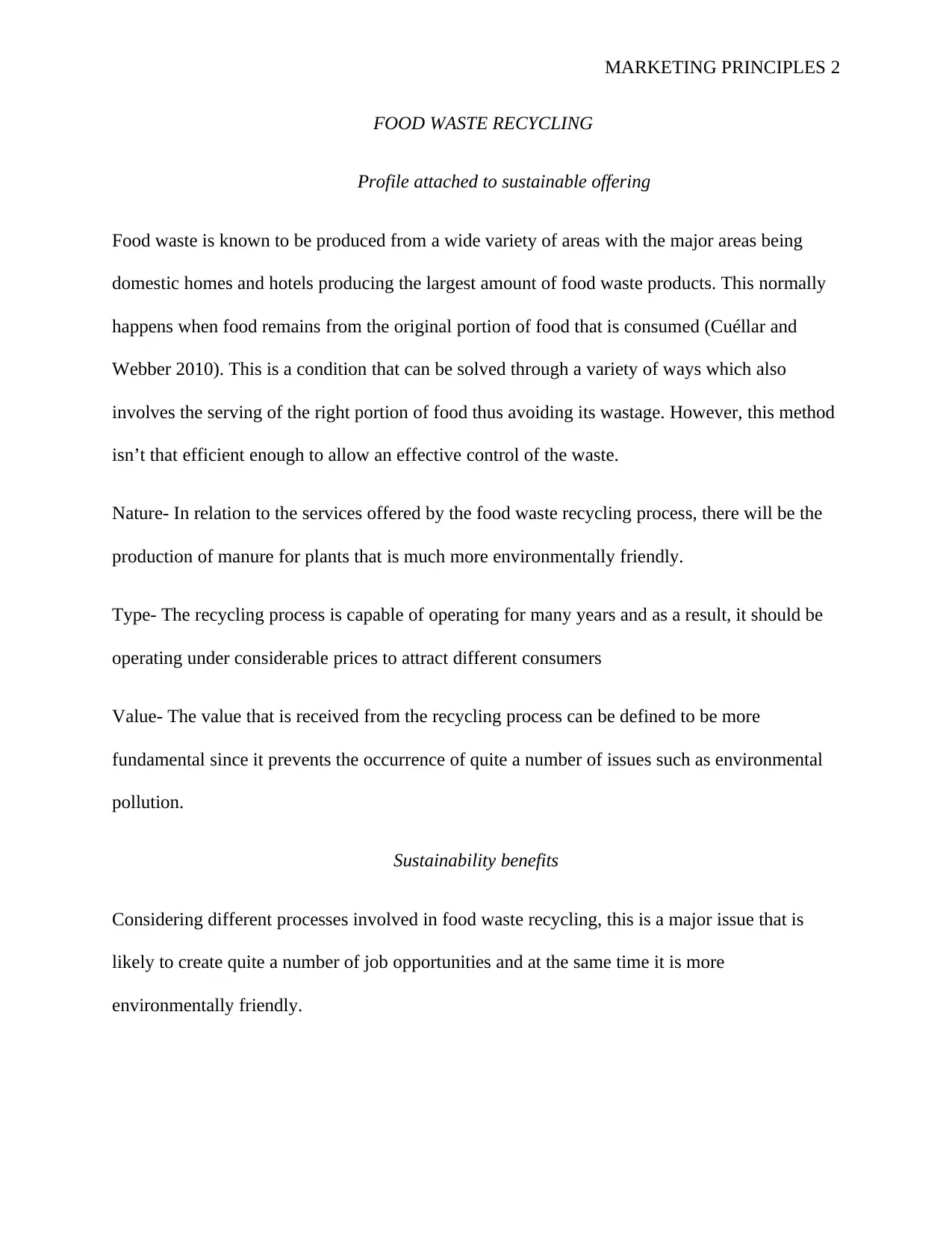
MARKETING PRINCIPLES 2
FOOD WASTE RECYCLING
Profile attached to sustainable offering
Food waste is known to be produced from a wide variety of areas with the major areas being
domestic homes and hotels producing the largest amount of food waste products. This normally
happens when food remains from the original portion of food that is consumed (Cuéllar and
Webber 2010). This is a condition that can be solved through a variety of ways which also
involves the serving of the right portion of food thus avoiding its wastage. However, this method
isn’t that efficient enough to allow an effective control of the waste.
Nature- In relation to the services offered by the food waste recycling process, there will be the
production of manure for plants that is much more environmentally friendly.
Type- The recycling process is capable of operating for many years and as a result, it should be
operating under considerable prices to attract different consumers
Value- The value that is received from the recycling process can be defined to be more
fundamental since it prevents the occurrence of quite a number of issues such as environmental
pollution.
Sustainability benefits
Considering different processes involved in food waste recycling, this is a major issue that is
likely to create quite a number of job opportunities and at the same time it is more
environmentally friendly.
FOOD WASTE RECYCLING
Profile attached to sustainable offering
Food waste is known to be produced from a wide variety of areas with the major areas being
domestic homes and hotels producing the largest amount of food waste products. This normally
happens when food remains from the original portion of food that is consumed (Cuéllar and
Webber 2010). This is a condition that can be solved through a variety of ways which also
involves the serving of the right portion of food thus avoiding its wastage. However, this method
isn’t that efficient enough to allow an effective control of the waste.
Nature- In relation to the services offered by the food waste recycling process, there will be the
production of manure for plants that is much more environmentally friendly.
Type- The recycling process is capable of operating for many years and as a result, it should be
operating under considerable prices to attract different consumers
Value- The value that is received from the recycling process can be defined to be more
fundamental since it prevents the occurrence of quite a number of issues such as environmental
pollution.
Sustainability benefits
Considering different processes involved in food waste recycling, this is a major issue that is
likely to create quite a number of job opportunities and at the same time it is more
environmentally friendly.
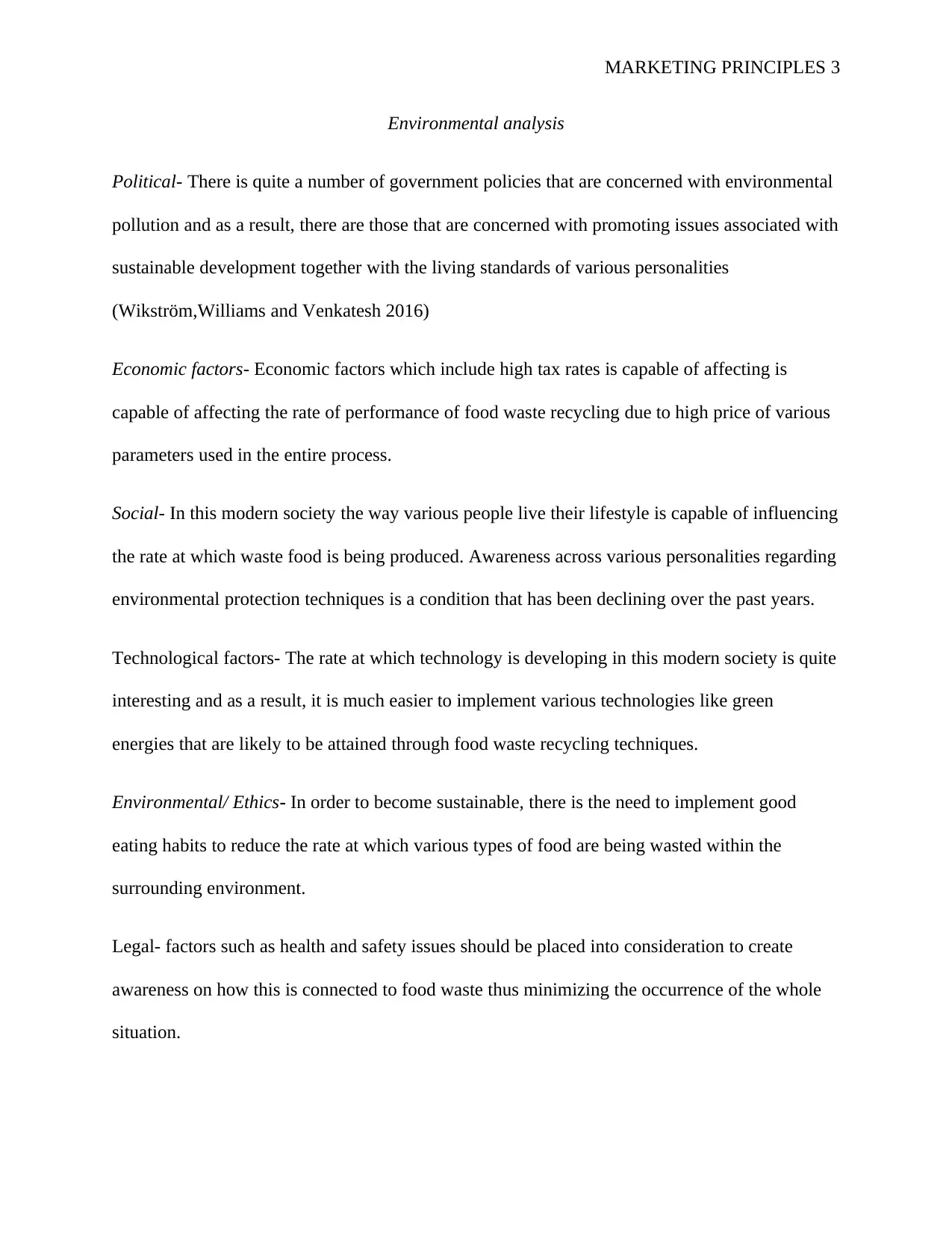
MARKETING PRINCIPLES 3
Environmental analysis
Political- There is quite a number of government policies that are concerned with environmental
pollution and as a result, there are those that are concerned with promoting issues associated with
sustainable development together with the living standards of various personalities
(Wikström,Williams and Venkatesh 2016)
Economic factors- Economic factors which include high tax rates is capable of affecting is
capable of affecting the rate of performance of food waste recycling due to high price of various
parameters used in the entire process.
Social- In this modern society the way various people live their lifestyle is capable of influencing
the rate at which waste food is being produced. Awareness across various personalities regarding
environmental protection techniques is a condition that has been declining over the past years.
Technological factors- The rate at which technology is developing in this modern society is quite
interesting and as a result, it is much easier to implement various technologies like green
energies that are likely to be attained through food waste recycling techniques.
Environmental/ Ethics- In order to become sustainable, there is the need to implement good
eating habits to reduce the rate at which various types of food are being wasted within the
surrounding environment.
Legal- factors such as health and safety issues should be placed into consideration to create
awareness on how this is connected to food waste thus minimizing the occurrence of the whole
situation.
Environmental analysis
Political- There is quite a number of government policies that are concerned with environmental
pollution and as a result, there are those that are concerned with promoting issues associated with
sustainable development together with the living standards of various personalities
(Wikström,Williams and Venkatesh 2016)
Economic factors- Economic factors which include high tax rates is capable of affecting is
capable of affecting the rate of performance of food waste recycling due to high price of various
parameters used in the entire process.
Social- In this modern society the way various people live their lifestyle is capable of influencing
the rate at which waste food is being produced. Awareness across various personalities regarding
environmental protection techniques is a condition that has been declining over the past years.
Technological factors- The rate at which technology is developing in this modern society is quite
interesting and as a result, it is much easier to implement various technologies like green
energies that are likely to be attained through food waste recycling techniques.
Environmental/ Ethics- In order to become sustainable, there is the need to implement good
eating habits to reduce the rate at which various types of food are being wasted within the
surrounding environment.
Legal- factors such as health and safety issues should be placed into consideration to create
awareness on how this is connected to food waste thus minimizing the occurrence of the whole
situation.
⊘ This is a preview!⊘
Do you want full access?
Subscribe today to unlock all pages.

Trusted by 1+ million students worldwide
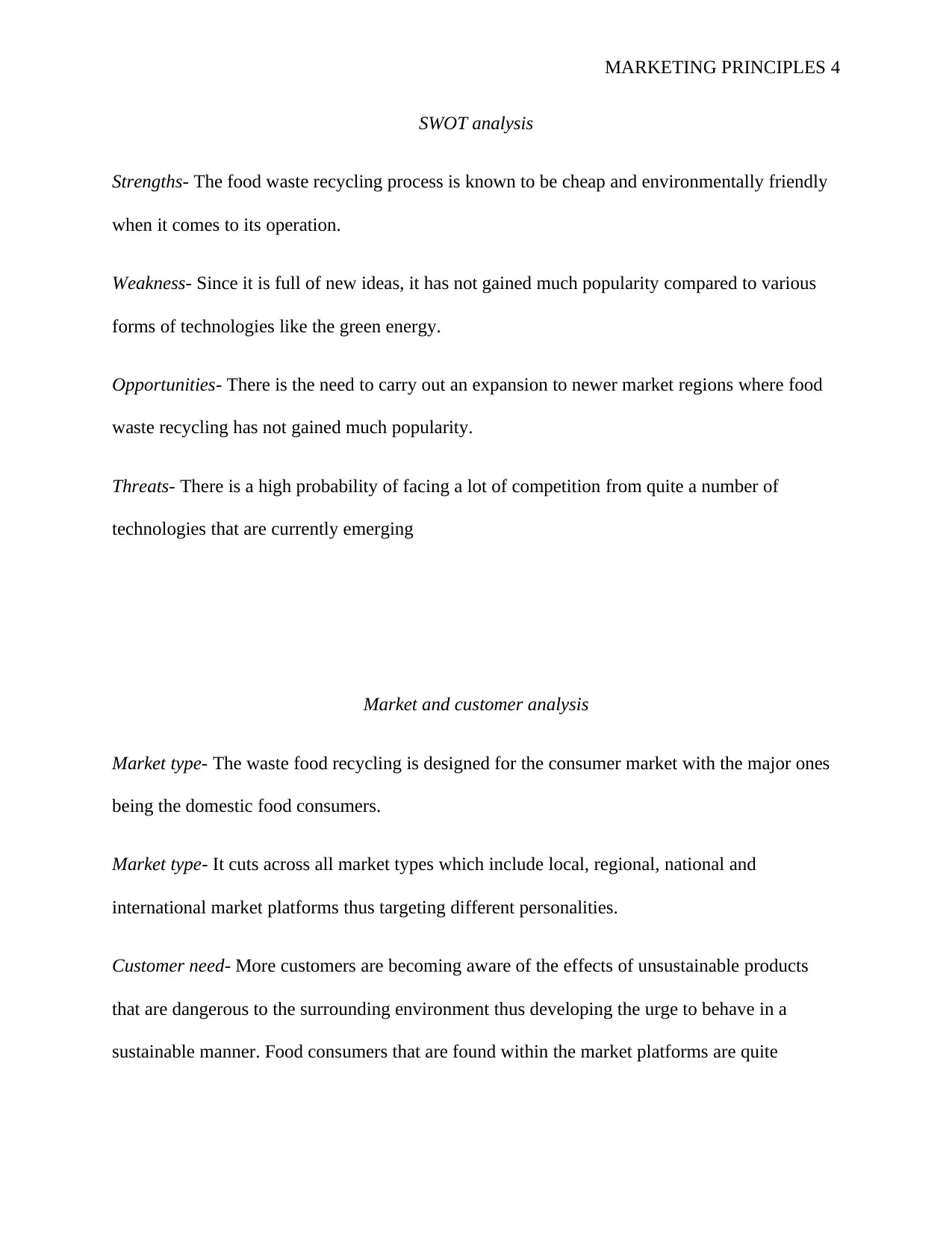
MARKETING PRINCIPLES 4
SWOT analysis
Strengths- The food waste recycling process is known to be cheap and environmentally friendly
when it comes to its operation.
Weakness- Since it is full of new ideas, it has not gained much popularity compared to various
forms of technologies like the green energy.
Opportunities- There is the need to carry out an expansion to newer market regions where food
waste recycling has not gained much popularity.
Threats- There is a high probability of facing a lot of competition from quite a number of
technologies that are currently emerging
Market and customer analysis
Market type- The waste food recycling is designed for the consumer market with the major ones
being the domestic food consumers.
Market type- It cuts across all market types which include local, regional, national and
international market platforms thus targeting different personalities.
Customer need- More customers are becoming aware of the effects of unsustainable products
that are dangerous to the surrounding environment thus developing the urge to behave in a
sustainable manner. Food consumers that are found within the market platforms are quite
SWOT analysis
Strengths- The food waste recycling process is known to be cheap and environmentally friendly
when it comes to its operation.
Weakness- Since it is full of new ideas, it has not gained much popularity compared to various
forms of technologies like the green energy.
Opportunities- There is the need to carry out an expansion to newer market regions where food
waste recycling has not gained much popularity.
Threats- There is a high probability of facing a lot of competition from quite a number of
technologies that are currently emerging
Market and customer analysis
Market type- The waste food recycling is designed for the consumer market with the major ones
being the domestic food consumers.
Market type- It cuts across all market types which include local, regional, national and
international market platforms thus targeting different personalities.
Customer need- More customers are becoming aware of the effects of unsustainable products
that are dangerous to the surrounding environment thus developing the urge to behave in a
sustainable manner. Food consumers that are found within the market platforms are quite
Paraphrase This Document
Need a fresh take? Get an instant paraphrase of this document with our AI Paraphraser
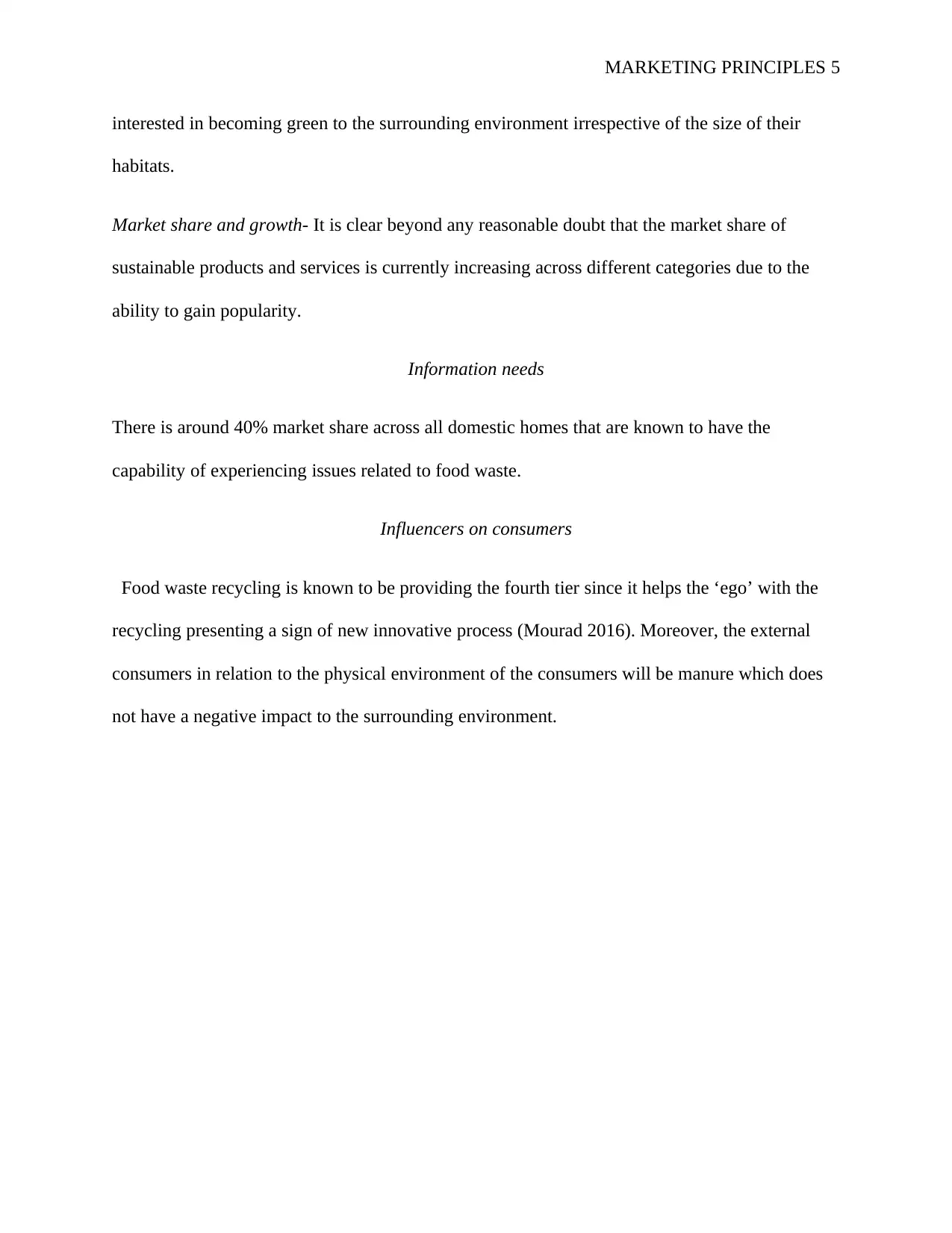
MARKETING PRINCIPLES 5
interested in becoming green to the surrounding environment irrespective of the size of their
habitats.
Market share and growth- It is clear beyond any reasonable doubt that the market share of
sustainable products and services is currently increasing across different categories due to the
ability to gain popularity.
Information needs
There is around 40% market share across all domestic homes that are known to have the
capability of experiencing issues related to food waste.
Influencers on consumers
Food waste recycling is known to be providing the fourth tier since it helps the ‘ego’ with the
recycling presenting a sign of new innovative process (Mourad 2016). Moreover, the external
consumers in relation to the physical environment of the consumers will be manure which does
not have a negative impact to the surrounding environment.
interested in becoming green to the surrounding environment irrespective of the size of their
habitats.
Market share and growth- It is clear beyond any reasonable doubt that the market share of
sustainable products and services is currently increasing across different categories due to the
ability to gain popularity.
Information needs
There is around 40% market share across all domestic homes that are known to have the
capability of experiencing issues related to food waste.
Influencers on consumers
Food waste recycling is known to be providing the fourth tier since it helps the ‘ego’ with the
recycling presenting a sign of new innovative process (Mourad 2016). Moreover, the external
consumers in relation to the physical environment of the consumers will be manure which does
not have a negative impact to the surrounding environment.
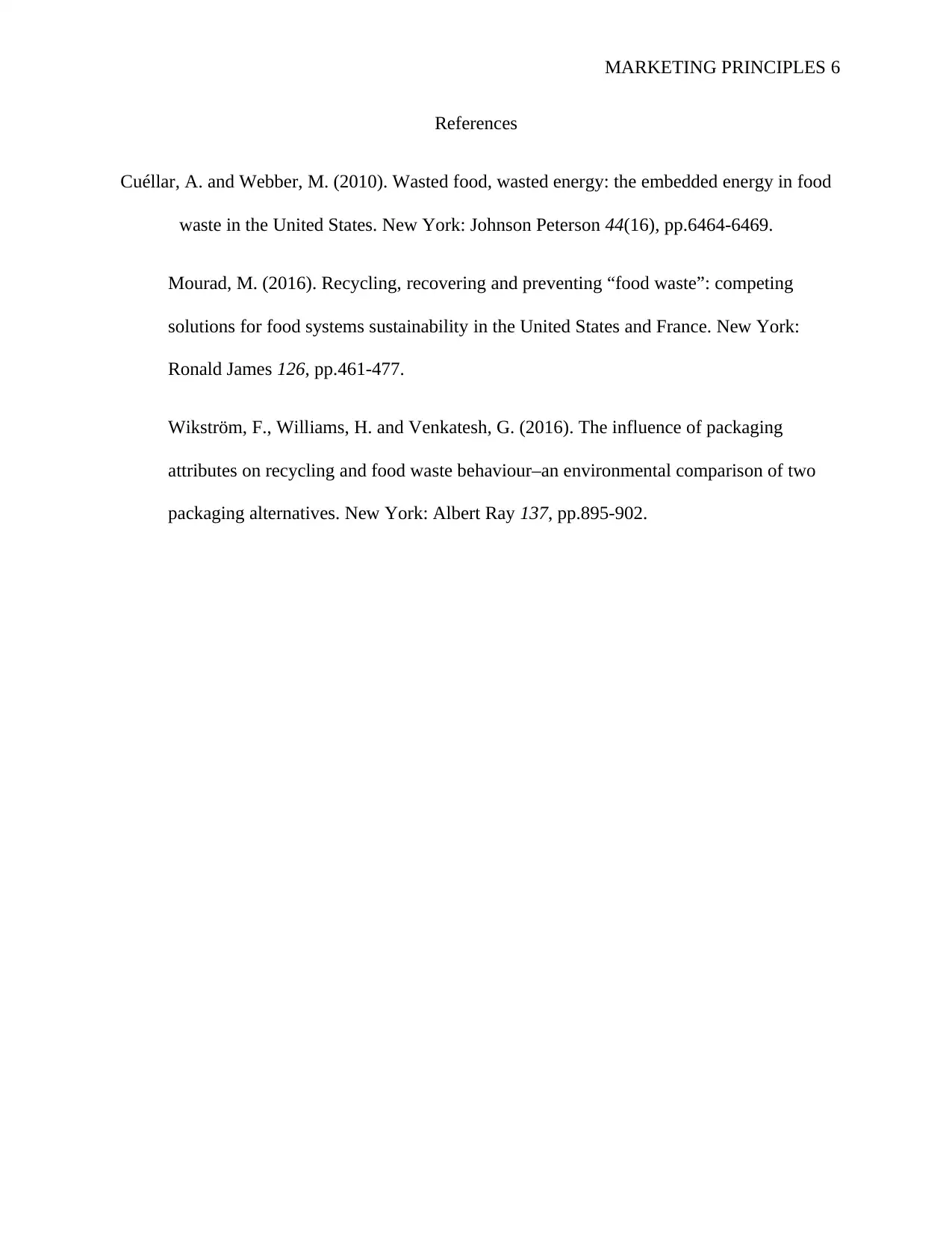
MARKETING PRINCIPLES 6
References
Cuéllar, A. and Webber, M. (2010). Wasted food, wasted energy: the embedded energy in food
waste in the United States. New York: Johnson Peterson 44(16), pp.6464-6469.
Mourad, M. (2016). Recycling, recovering and preventing “food waste”: competing
solutions for food systems sustainability in the United States and France. New York:
Ronald James 126, pp.461-477.
Wikström, F., Williams, H. and Venkatesh, G. (2016). The influence of packaging
attributes on recycling and food waste behaviour–an environmental comparison of two
packaging alternatives. New York: Albert Ray 137, pp.895-902.
References
Cuéllar, A. and Webber, M. (2010). Wasted food, wasted energy: the embedded energy in food
waste in the United States. New York: Johnson Peterson 44(16), pp.6464-6469.
Mourad, M. (2016). Recycling, recovering and preventing “food waste”: competing
solutions for food systems sustainability in the United States and France. New York:
Ronald James 126, pp.461-477.
Wikström, F., Williams, H. and Venkatesh, G. (2016). The influence of packaging
attributes on recycling and food waste behaviour–an environmental comparison of two
packaging alternatives. New York: Albert Ray 137, pp.895-902.
⊘ This is a preview!⊘
Do you want full access?
Subscribe today to unlock all pages.

Trusted by 1+ million students worldwide
1 out of 6
Related Documents
Your All-in-One AI-Powered Toolkit for Academic Success.
+13062052269
info@desklib.com
Available 24*7 on WhatsApp / Email
![[object Object]](/_next/static/media/star-bottom.7253800d.svg)
Unlock your academic potential
Copyright © 2020–2026 A2Z Services. All Rights Reserved. Developed and managed by ZUCOL.





